
Community Spotlight: Julia DiTosto
Julia DiTosto, MS, is a PhD student in Epidemiology whose research explores how gynecologic conditions like fibroids and PCOS may impact long-term heart health. Using real-world data and causal inference methods, she aims to generate insights that improve care for reproductive-age populations.

Journal of Human Hypertension Article Co-Authored by Dr. Jordana Cohen
A new study co-authored by Dr. Jordana Cohen explores the risks of white coat hypertension and emphasizes the importance of out-of-office blood pressure monitoring for accurate diagnosis and treatment.

Penn Medicine’s Mobile Mammogram Van Rolls Out July 13 at West Philly Health Fair
Carmen Guerra, MD, MSCE, is launching a mobile mammography program on July 13 to expand access to mammography for communities in and around Philadelphia.

Congratulations to Dr. Ellie Caniglia on Receiving the Brian MacMahon Early Career Epidemiologist Award!
Congratulations to Dr. Ellie Caniglia on receiving the Brian MacMahon Early Career Epidemiologist Award in recognition of her outstanding contributions to epidemiology.

Dr. Alexis Ogdie Co-Authors Study on Patient Groups and Treatment in Psoriatic Arthritis
Dr. Alexis Ogdie co-authored a study published in the Annals of the Rheumatic Diseases that explores distinct patient groups and treatment responses in psoriatic arthritis.

New Study Co-Authored by Dr. Alexis Ogdie Explores Patient Treatment Goals in Psoriatic Arthritis
A new study in Arthritis Care & Research, co-authored by Dr. Alexis Ogdie, explores patient-defined treatment goals in psoriatic arthritis.

Dr. Alexis Ogdie Featured on Medscape’s InDiscussion Podcast
Dr. Alexis Ogdie joins Medscape’s InDiscussion podcast to talk about digital tools for psoriatic disease, including the development of the Psorcast app and the future of technology in rheumatology care.

Celebrating Dr. Joel M. Gelfand at the National Psoriasis Foundation Gala
Congratulations to Dr. Joel M. Gelfand on being honored with a gala celebrating his groundbreaking contributions to dermatology, epidemiology, and patient-centered research.

Community Spotlight: Dr. Karen Glanz
Karen Glanz, PhD, MPH, is the George A. Weiss University Professor with joint appointments in Penn’s Perelman School of Medicine and School of Nursing. Her work focuses on translating theory into practice to address critical public health issues like physical activity, obesity, and health equity.

Congratulations to Dr. Alisa Stephens Shields on Her JAMA Network Article
Congratulations to Dr. Alisa Stephens Shields on her recent JAMA Network Open publication evaluating the impact of COVID-19 self-test kit distribution in underserved communities.

Alumni Spotlight: Arman Oganisian, BA, MS, PhD
Before joining Brown University as an Assistant Professor of Biostatistics, Arman Oganisian, PhD, completed his PhD in Biostatistics at the University of Pennsylvania.

Congratulations to Basam Alasaly on His Presentation at the AMIA Clinical Informatics Conference
Congratulations to Basam Alasaly, from Penn Medicine’s AI4AI Lab, for presenting at the AMIA 2025 Clinical Informatics Conference.

Community Spotlight: Dr. Jordana Cohen
Jordana B. Cohen, MD, MSCE is an Associate Professor of Medicine and Epidemiology in the Department of Biostatistics, Epidemiology, and Informatics, a Senior Scholar in the Center for Clinical Epidemiology and Biostatistics (CCEB), and a Fellow at the Leonard Davis Institute of Health Economics.
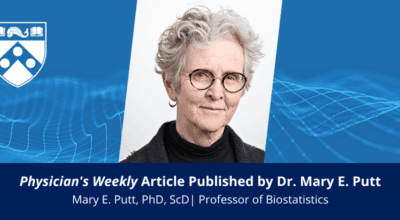
Congratulations to Dr. Mary Putt on Her Publication in Physician’s Weekly
Congratulations to Dr. Mary E. Putt on her recent publication in Physician’s Weekly exploring how brain activity following electroconvulsive therapy (ECT) could hold new clues for improving treatment of severe, treatment-resistant depression.

Congratulations to Dr. Kevin B. Johnson on His REDCap Publication in The Scientist
Congratulations to Dr. Kevin B. Johnson on his publication in The Scientist highlighting the development and global impact of REDCap as a vital tool for clinical research data management.

Congratulations to Dr. Nandita Mitra on Her Election as President of the Society for Causal Inference
Congratulations to Dr. Nandita Mitra on her election as President of the Society for Causal Inference. This leadership role recognizes her longstanding contributions to the field and her commitment to advancing research and collaboration in causal inference.

Congratulations to Dr. Anne Marie McCarthy on Her Radiology Publication, “Radiomic Parenchymal Phenotypes of Breast Texture from Mammography and Association with Risk of Breast Cancer”
Congratulations to Dr. Anne Marie McCarthy on her recent publication in Radiology, highlighting how advanced imaging techniques can uncover subtle breast tissue patterns linked to cancer risk.

Congratulations to Dr. Rui Xiao on Her Nature Publication, “Zebrafishology, study design guidelines for rigorous and reproducible data using zebrafish”
Congratulations to Dr. Rui Xiao on her Nature publication offering new guidelines to support rigorous and reproducible research using zebrafish, a key model in biomedical science.

Congratulations to Dr. Mingyao Li on Her Nature Publication, “Spatial Transcriptomics Reveals Human Cortical Layer and Area Specification”
Congratulations to Dr. Mingyao Li on her recent publication in Nature, which maps early human brain development using spatial transcriptomics. The study reveals that cortical layers and areas are specified earlier than previously thought, offering new insight into how the brain takes shape.

AIDS Article Authored by Penn Researchers, “Association of HIV status with infections complicating abortion in Botswana”
Penn researchers have published new findings in AIDS showing that HIV status may influence the risk of infection following abortion. The study focuses on patients in Botswana and underscores the importance of improving reproductive health care and equity for people with HIV.

Congratulations to Dr. Sean Hennessy on His Publication in the American Journal of Epidemiology
Congratulations to Dr. Sean Hennessy on his recent publication in the American Journal of Epidemiology, which uses a new statistical method to better understand the real-world effects of testosterone therapy. The study offers valuable insights into balancing its potential benefits and risks in clinical care.

Congratulations to Dr. Joshua Baker on His Review, “Metabolic Consequences of Rheumatoid Arthritis”
Congratulations to Dr. Joshua Baker on his invited review explaining the connection between rheumatoid arthritis and metabolism, and how this link affects patient care amid new obesity treatments and improvements in arthritis management.

Congratulations to Dr. Jordana Cohen on Her Editorial, “Rethinking Confirmatory Testing in Primary Aldosteronism”
Congratulations to Dr. Jordana Cohen on her editorial in Annals of Internal Medicine, where she highlights important considerations around diagnostic testing for primary aldosteronism and its impact on patient care.

Qi Long Named Institute of Mathematical Statistics Fellow
Qi Long, Professor at the University of Pennsylvania, has been named a Fellow of the Institute of Mathematical Statistics—a prestigious honor awarded for his impactful work in advancing data science and applying statistics to improve biomedical research.
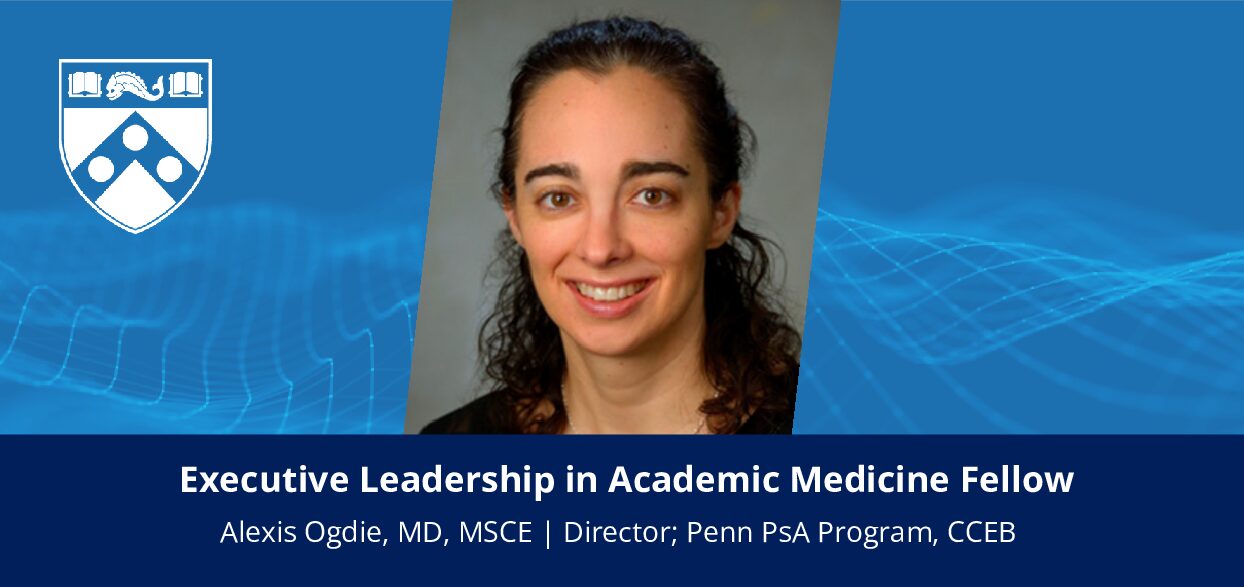
Alexis Ogdie, MD, MSCE, selected Executive Leadership in Academic Medicine Fellow
Alexis Ogdie, MD, MSCE, selected Executive Leadership in Academic Medicine Fellow.

Dr. Yong Chen Awarded $8 Million to Advance Mental Health Diagnostics Using AI
Dr. Yong Chen has been awarded $8 million to lead a national effort using AI to improve how mental health conditions are diagnosed and treated—part of a larger $150 million initiative to advance mental health research.

Income Differences Explain Racial Disparities in IBD Care, Study Finds
A new study led by James Lewis, MD, MSCE, finds that racial and ethnic gaps in IBD care are closely tied to socioeconomic factors—highlighting the need for more equitable access to treatment and specialist care.

Visual Impairment, Age-Related Eye Disease, and Sleep Dysfunction in Older Adults
Sleep issues are common in older adults–but vision problems may be part of the cause. A new study by Alan Y. Huang, Joshua R. Ehrlich, and Ali G. Hamedani finds that those with visual impairments are more likely to use sleep medications, highlighting a connection between eye health and sleep quality.

Widespread Statistical Problems with Dietary Trials
Flawed study designs in nutrition research may be leading to misleading advice about healthy eating. DBEI’s Mary E. Putt, ScD, and co-authors warn that many popular dietary trials are too short and poorly structured to give reliable results-putting future nutrition guidelines at risk.

Jinbo Chen, PhD elected 2024 American Association for the Advancement of Science Fellow
Jinbo Chen, PhD elected 2024 American Association for the Advancement of Science Fellowof this post here.

Nandita Mitra, PhD, has been awarded the Lindback Foundation Award for Distinguished Teaching.
Nandita Mitra, PhD has been awarded the Lindback Foundation Award for Distinguished Teaching.

Dr. Eric Tchetgen Tchetgen Awarded David Cox Medal for Statistics
Dr. Eric Tchetgen Tchetgen has been awarded the inaugural David Cox Medal for Statistics, which honors mid-career researchers for outstanding contributions to the field.

Electronic Nudges Improve End-of-Life Care Discussions in ICUs
Penn researchers, including Drs. Halpern and Harhay, found that electronic nudges improved end-of-life care discussions in ICUs, increasing hospice discharges and comfort-care orders without shortening hospital stays.

From Nudge to Habit: Penn Study Finds Lasting Gains in Seatbelt Use
Penn Medicine researchers, including M. Kit Delgado, MD, MS, found that small financial incentives using connected car data significantly increased seatbelt use—even after rewards ended—offering a low-cost, scalable strategy to improve driver safety nationwide.

Elizabeth Diemer, PhD, Appointed Assistant Professor of Epidemiology
Elizabeth Diemer, PhD, brings expertise in causal inference and mental health epidemiology to her new role as an Assistant Professor of Epidemiology within the department.

Exploring AI and Precision Health: A Recap of the 2025 DBEI Research Day
The 2025 DBEI Research Day highlighted groundbreaking advancements in precision health and artificial intelligence. Attendees engaged in insightful discussions, showcasing innovative research and fostering collaboration to advance health, science, and education.

Three DBEI Faculty Members To Be Honored with ATS Awards
Drs. Christie, Halpern, and Harhay are to be honored by the American Thoracic Society (ATS) for excellence in research, humanism, and mentorship. Awards will be presented at the 2025 ATS International Conference in San Francisco (May 18-21, 2025).

AI ‘Scribe’ Reduces Clinician Workload, Improves Patient Interaction
Kevin B. Johnson, MD, MS, and Penn Medicine researchers conducted a study demonstrating how an AI-powered scribe technology reduces clinician workload, enhances patient interactions, and decreases after-hours documentation, improving efficiency and easing physician burnout.

Rising Temps, Rising Risks: How Climate Change Impacts Diabetes
Rising temperatures pose serious risks for people with type 2 diabetes, increasing the likelihood of heat exhaustion, blood sugar fluctuations, and cardiac issues. Charles Leonard, PharmD, MSCE, FISPE addresses these health threats with Yale Climate Connections.

New Report Examines the Risks of Co-Prescribing Opioids and Benzodiazepines to Veterans
A new National Academies of Sciences, Engineering, and Medicine (NASEM) report, involving DBEI experts Brian Strom, MD, MPH and John Farrar, MD, PhD, finds that co-prescribing opioids and benzodiazepines to veterans increases the risk of death, highlighting critical implications for veteran health care.

M. Kit Delgado, MD, MS, Elected to the American Society for Clinical Investigation
Muscio Kit Delgado, MD, MS, Associate Professor of Emergency Medicine and Epidemiology, has been elected to the ASCI. His research blends behavioral and data science with insights gleaned from practicing emergency medicine in an urban trauma center to help promote smarter health choices and policy.

Celebrating Informatics Excellence: Johnson and Shen Recognized by ACMI
Kevin B. Johnson, and Li Shen—faculty in the Division of Informatics—were recognized by the American College of Medical Informatics (ACMI) at the AMIA 2024 Annual Symposium.

Using AI to Uncover Hospital Patients’ Long COVID Care Needs
In a new study, Yong Chen, PhD and colleagues at Penn Medicine, used AI and latent transfer learning to analyze long-COVID data, identifying four patient sub-populations with distinct care needs, improving hospital resource allocation and tailoring treatment for diverse patient populations.

AI Tool Analyzes 30K Data Points Per Medical Imaging Pixel in Cancer Search
Mingyao Li, PhD and her Penn Medicine colleagues developed an AI-powered tool called MISO (Multi-modal Spatial Omics) that can detect cell-level characteristics of cancer by looking at data from extremely small pieces of tissue—some as small as the width of five human hairs.

Vaccine Communication in a Polarized World: Dr. Morris Interviewed in Undark Magazine
Amid rising polarization and misinformation, Jeffrey Morris, PhD, of Penn Medicine tackles vaccine skepticism with evidence-based insights. In an interview with Undark, he advocates respectful dialogue that considers social and political dynamics.

The University of Pennsylvania Prevention Research Center Awarded a $6.5 Million CDC Grant
The University of Pennsylvania Prevention Research Center has received a $6.5 million CDC grant to advance community-based prevention research, focusing on improving shared decision-making for older cancer patients. This five-year project will study interventions tailored to patients’ needs, enhancing outcomes in Philadelphia and beyond.

New Framework for Health Policy Evaluation: Target Trial Emulation Enhances Accuracy in Nonexperimental Studies
In Annals of Internal Medicine, Nicholas Seewald, PhD, introduces a framework for target trial emulation, enabling researchers to evaluate health policies with the rigor of clinical trials in nonexperimental studies.

Glen Lafferty
Contact Blockley Hall (Room 114)423 Guardian DrivePhiladelphia, PA 19104 Office: 215-898-4691 glaffert@pennmedicine.upenn.edu

Mark Chanel, MBA, MSc
Contact Blockley Hall (Room 818)423 Guardian DrivePhiladelphia, PA 19104 mark.chanel@pennmedicine.upenn.edu

Penn and CHOP Researchers Secure $50M NIH Grant to Study Environmental Impact on Pregnancy and Children’s Health
Penn and CHOP researchers receive a $50 million NIH grant to study how environmental exposures impact pregnancy and child health, aiming to reduce health disparities and improve maternal-child outcomes.

Sandra Barile
Contact Blockley Hall (Room 922)423 Guardian DrivePhiladelphia, PA 19104 Office: 215-746-8557 sabarile@pennmedicine.upenn.edu

Catherine Vallejo
Contact Blockley Hall (Room 633)423 Guardian DrivePhiladelphia, PA 19104 Office: 215-573-4922Fax: 215-573-4865 vallejo@pennmedicine.upenn.edu

Marissa Fox
Contact Blockley Hall (Room 633)423 Guardian DrivePhiladelphia, PA 19104 Office: 215-573-7393 mfox@pennmedicine.upenn.edu

Community Spotlight: Dr. Joseph Romano
Joseph Romano, PhD, MPhil, MA is an Assistant Professor of Informatics in the Department of Biostatistics, Epidemiology and Informatics, Senior Fellow in the Institute for Biomedical Informatics (IBI) and an investigator in the Center of Excellence in Environmental Toxicology (CEET).

Natalya Levina, MS
Contact Blockley Hall (Room 923)423 Guardian DrivePhiladelphia, PA 19104 Office: 215-573-6167 natalya.levina@pennmedicine.upenn.edu

Community Spotlight: Dr. Stephens Shields
Alisa Stephens Shields, PhD serves as an Associate Professor in the Biostatistics division of the Department of Biostatistics, Epidemiology and Informatics, and is recognized for her collaboration and impactful leadership in the realms of health, statistical education, and inclusion in the field.

Community Spotlight: Kacie Bogar, MS
For almost three years, Kacie Bogar, MS has served as a Research Project Manager for the Center for Real-World Effectiveness and Safety of Therapeutics (CREST) and the Epidemiology division in the Department of Biostatistics, Epidemiology and Informatics.

Dr. Stephens Shields Honored with 2024 Myrto Lefkopoulou Distinguished Lectureship
Alisa Stephens Shields, PhD, Associate Professor of Biostatistics, was selected by the Harvard T.H. Chan School of Public Health to receive the 2024 Myrto Lefkopoulou Distinguished Lectureship.

Alumni Spotlight: Rui Duan, PhD
Before joining Harvard University as an Assistant Professor of Biostatistics, Rui Duan, PhD, completed her PhD in Biostatistics at the University of Pennsylvania.

Alumni Spotlight: Edward Kennedy, PhD
Edward Kennedy, PhD is a Penn alum through and through—prior to completing his PhD in Biostatistics in 2016, he earned his BA in Mathematics (2007) and MA in Statistics (2014) from the University.

Meghann Risell
Contact 6th Floor, South Pavilion PCAM Expansion3400 Civic Center Boulevard, Bldg. 421Philadelphia, PA 1910 Office: 215-898-8731 Mobile: 609-784-5116meghann.risell@pennmedicine.upenn.edu

Questioning Restrictions on Physical Activity for Risk of Preterm Birth
Penn undergraduates assist Beth Leong Pineles, MD, PhD with a study of activity restriction during pregnancy with the goal of “deimplementation” in the Penn Medicine system and ultimately nationwide.

Dr. Michael Harhay Highlights the Growing Impact of Bayesian Statistics on Clinical Research
Michael Harhay, PhD, MPH, co-authors "Bayesian Statistics for Clinical Research" in The Lancet, comparing Bayesian and frequentist methods and highlighting the growing accessibility and impact of Bayesian analysis in medical research.

Marylyn D. Ritchie, PhD, FACMI
Dr. Ritchie is an expert in translational bioinformatics, with a focus on developing, applying, and disseminating algorithms, methods, and tools integrating electronic health records (EHR) with genomics. The mission of […]

Dr. Kit Delgado Featured in Undark Magazine for Advancing Health Care with Nudge Theory
In a recent Undark feature, Dr. M. Kit Delgado, Associate Professor of Emergency Medicine, discusses how behavioral science and nudge theory are transforming health care decision-making.

Dr. Mingyao Li Explores the Transformative Role of AI in Spatial Omics Research in Nature Methods
Dr. Mingyao Li's article in Nature Methods discusses how artificial intelligence is revolutionizing spatial omics, enhancing integration of diverse data and accelerating biological discoveries for improved health outcomes in biomedical research.

When There’s Money to Lose, Phone Usage While Driving Drops
Can cash incentives make roads safer? A Penn Medicine study led by Dr. M. Kit Delgado reveals how rewards and feedback can significantly cut down handheld phone use while driving.

Jiayin Zheng, PhD, Appointed Assistant Professor of Biostatistics
Join us in welcoming Jiayin Zheng, PhD, as an Assistant Professor of Biostatistics. Dr. Zheng’s research spans data integration, bioequivalence, and survival analysis, collaborating across neurology, cancer, and infectious disease.

Qi Long, PhD, Appointed New Vice Chair of Faculty Professional Development
Qi Long, PhD, Professor of Biostatistics, has been appointed as the new DBEI Vice Chair of Faculty Professional Development, effective July 1, 2024 through June 30, 2027.

Dr. Nandita Mitra Wins 2024 Cupples Award for Excellence in Research, Teaching, and Leadership
Nandita Mitra, PhD, Professor of Biostatistics, has been awarded the 2024 L. Adrienne Cupples Award for her outstanding contributions to research, teaching, and leadership in biostatistics and public health.

When Studies Conflict, How Can You Know Which Meds Work?
Penn Medicine researchers are developing AI-powered tools to help clinicians interpret conflicting clinical trial results, aiming to improve patient care and decision-making.

LauraEllen Ashcraft, PhD, MSW, Appointed Assistant Professor of Epidemiology
Joining the DBEI as an Assistant Professor of Epidemiology, LauraEllen Ashcraft, PhD, MSW, will support the development of implementation science infrastructure across divisions.

Penn Launches New Epidemiology Track in MPH Program to Address Global Health Challenges
The Department of Biostatistics, Epidemiology and Informatics and Master of Public Health Program at the University of Pennsylvania have established an Epidemiology track within the MPH Program, an interdisciplinary graduate program focused on preparing the next generation of public health leaders.

Penn Medicine Study Shows High Pregnancy Weight Gain Tied to Higher Risk of Death in the Following Decades
Excess weight gain during pregnancy increases long-term death risk from heart disease and diabetes, a Penn Medicine study finds, highlighting the need for better prenatal weight management and preventive care.

Kevin B. Johnson, MD, MS Receives the NIH Director’s Pioneer Award
Kevin B. Johnson, MD, MS was awarded the NIH Director’s Pioneer Award under the “High-Risk, High-Reward Research” program funded by the National Institutes of Health Common Fund. Established in 2004, the NIH […]

New Study Links Atopic Dermatitis to Higher Risk of Irritable Bowel Disease
Joel Gelfand, MD, the James J. Leyden, M.D. Endowed Professor in Clinical Investigation of Dermatology and Epidemiology, and colleagues at Penn found that adults and children with atopic dermatitis (AD) […]

Farrar and Schisterman Named to National Academies of Sciences, Engineering, and Medicine Ad-hoc Committees
Earlier this year, John Farrar, MD, PhD and Enrique Schisterman, PhD were named to National Academies of Sciences, Engineering, and Medicine ad-hoc committees. Farrar serves on “Evaluating the Effects of Opioids and Benzodiazepines on […]

2023 ASA Fellows: Phyllis Gimotty and Alisa Stephens-Shields
In April 2023, the American Statistical Association (ASA) bestowed its prestigious distinction of Fellow on Phyllis Gimotty, PhD, Alisa Stephens-Shields, PhD, and 45 other ASA members for their professional contributions, leadership, and commitment […]

Pregnancy Complications Tied to Higher Risk of Death As Long As 50 Years Later
Pregnancy complications like preterm birth and high blood pressure increase long-term death risk, a Penn Medicine study finds, highlighting the need for preventive care decades after childbirth.

Examining Places Where People Experiencing Homelessness Overdose
Elizabeth Nesoff, PhD, MPH discusses her recently published study in the Leonard Davis Institute of Health Economics (LDI) blog investigating neighborhood features that were correlated with fatal opioid overdoses among the […]

Podcast focuses on developing new ways to identify aggressive breast cancer
Anne Marie McCarthy, PhD was featured on the Real Pink Podcast where she discussed the development of new ways to identify people with high risk of aggressive breast cancer. Understanding your breask cancer risk

Penn Medicine has opened a Center for Living Donation
Penn Medicine has opened a Center for Living Donation, bringing under one roof its services for patients who receive kidney, liver, and uterus transplants with organs donated by living people. […]

How outdated rules restrict gay men from donating blood
Dr. Kevin Johnson, MD, MS, FAAP, FAMIA, FACMI shares his experience trying to donate blood as a gay man and discusses how the Unites States has more restrictive rules than […]

Stroke, Clot Risk Halved in Patients with Heart Disease and Arrhythmia Who Took Blood Thinners Apixaban Versus Rivaroxaban
A difference in the effectiveness against strokes and other blood clots was easily visible in the first year among patients who’d taken the anticoagulant apixaban rather than rival rivaroxaban, according […]
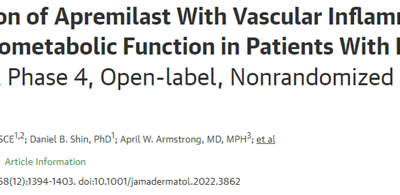
Penn Research Finds Psoriasis Medication Leads to Fat Loss
First study author, Joel M. Gelfand, MD, MSCE, and the investigators discovered that apremilast (brand name Otezla), which has helped psoriasis patients achieve clearer skin and ease the symptoms of their psoriatic arthritis, could […]

Researchers Use AI to Predict Rare Diseases
Penn Medicine researchers will help lead the development of an algorithm to flag patients at risk of rare disease thanks to a $4.7 million NIH grant. This 4-year U01 will involve 10 […]
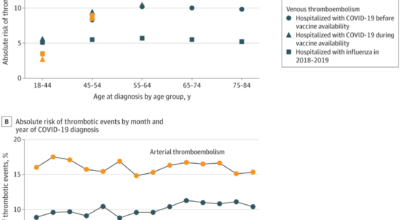
People with Severe COVID-19 Face Increased Risk of Life-Threatening Blood Clots
COVID-19 has been associated with a multitude of diseases, but can it also increase the risk of dangerous blood clots? Dr. Vincent Lo Re III and colleagues explore the risk […]

False Alarm? Critical Antibiotic Combination Used for Millions of Patients May Not Carry a Previously Reported Risk
Patients come to a hospital nearly 36 million times each year in the US, and antibiotics are often part of the picture: One large study showed that clinicians prescribed them […]

Making the EHR Into a Benefit, Not a Burden
In 1991, the National Academies of Sciences, Engineering and Medicine declared that computer-based patient records were an essential technology for health care. The new records would not only support patient […]

Mapping Gene Activity Down to the Cellular Level
Advanced spatial transcriptomics techniques are advancing our understanding of cancer and other diseases at the cellular level: “You can zoom in, you can look at the tissue-specific features, how many […]

The Latest on Paxlovid
In a review of current facts about the antiviral drug Paxlovid, Susan Ellenberg, PhD, comments on Pfizer’s unusual release of interim results during an ongoing clinical trial. Read the article […]

Knashawn Morales & Wei-Ting Hwang New ASA Fellows
Knashawn Morales, ScD, and Wei-Ting Hwang, PhD, have been named as new Fellows of the American Statistical Association. The world’s largest community of statisticians, the ASA is known as the […]

Social Media’s Promise for Medical Research
For medical researchers who aim to understand the patient experience, “collecting abundant social-media data is cost-effective, does not involve burdening participants, and is available in real time,” Graciela Gonzalez Hernandez, […]

Finding the Right Logic for Masking Rules
If Philadelphia’s masking policy aims to prevent spread of Covid-19, emphasizing hospitalization numbers, a lagging indicator, over case numbers isn’t wise, comments Michael Levy, PhD. “It’s like instead of using […]

Innovative Text Messaging Plus a Nursing Team: Dramatic Covid Results Hint at Broader, Equitable Potential
At the start of the pandemic, professionals working in health systems across the US realized that if a sizable portion of the many people infected with SARS-CoV-2 went to hospitals, […]
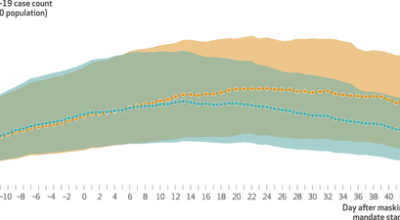
Masking Policies for Covid-19: What Does the Science Say?
Masking policies during Covid-19 have inspired plenty of political debate, but scientific evidence about the policies’ effects has been very limited. This isn’t surprising, given that it is not practical […]

Many Hospitalized for Other Ailments Test Positive for Covid, Too
Amid the omicron surge, more patients are coming into the hospital for other reasons but testing positive for Covid-19 once they arrive. M. Kit Delgado, MD, MS, says that many […]

Not Really a “˜White Man’s Disease’
A diagnosis of ankylosing spondylitis finally explained Christi Taylor-Gentry’s throbbing joint pain. But as recently as 2006, when Alexis Ogdie-Beatty, MD, MSCE, became a doctor, she was taught that the […]
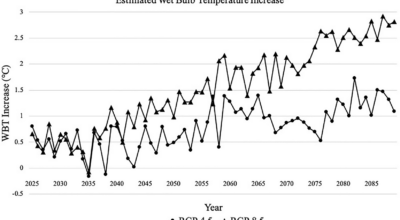
With Climate Change, More Cases of Kidney Stones
In addition to making events such as catastrophic flooding more frequent, climate change will negatively affect human health in many other ways. Prior research has demonstrated, for instance, that high […]

Kevin Johnson Named David L. Cohen University Professor
Kevin Johnson, MD, MS, FAAP, FAMIA, FACMI, has been named the David L. Cohen University Professor. Dr. Johnson says that like Cohen, he believes in uniting various sectors to achieve […]